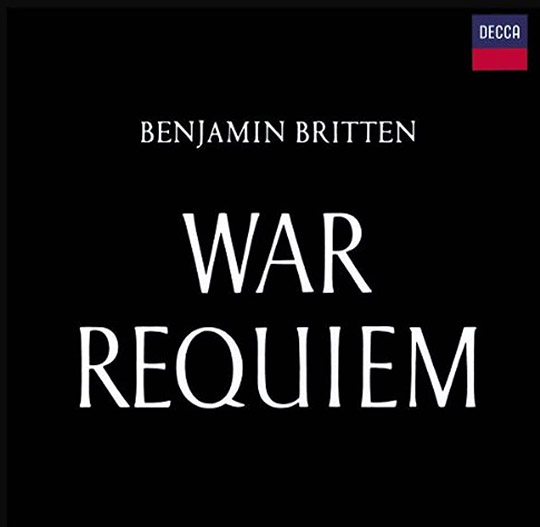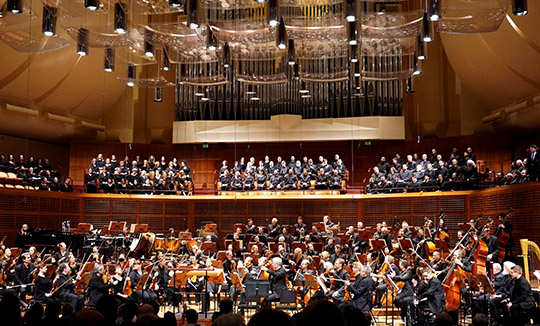Benjamin Britten's War Requiem premiered in 1962 and a recording with one of the most striking album covers in history was released in 1963. It featured the performers for whom it was written: English tenor Peter Pears, the German baritone Dietrich Fischer-Dieskau, and Russian soprano Galina Vishnevskaya, a trio from three countries that had just been at war with each other. To everyone's amazement, the 90-minute, two-disc set became a worldwide bestseller and may still be the best recording of the work, partly because Britten himself conducted his own score.
Last weekend the San Francisco Symphony along with the Symphony Chorus performed the work for the first time in a decade and as usual it was glorious to experience the work live.
It's a tricky piece to pull off in a live performance, though, because there are so many competing forces between soloists, chorus, full orchestra, chamber orchestra, and a large, distant boys chorus that is accompanied by an organ. The music bounces from ascetic to massive and everything in between, and it requires a conductor who can juggle and integrate all the moods. Unfortunately, Swiss conductor Philippe Jordan led most of the big choral sections as if they were Carl Orff's pounding Carmina Burana rather than Britten's brilliant riff on Verdi's Requiem. In the final Libera Me chorus, which should be taking the listener to a moment of shock and awe, there was instead just a huge wall of sound where voices and instruments were indistinguishable.
This was too bad because everyone else involved in the performance was so good. Though nobody is ever going to replace Vishnevskaya, who could somehow surf over huge waves of sound with full-throttled Slavic intensity, the young American soprano Jennifer Holloway held her own with a huge, beautiful voice.
The English tenor Ian Bostridge, who has been specializing in Britten for decades, was making his San Francisco Symphony debut. Though he often seemed to be singing in a different performance from everyone else with his hyper-enunciation and theatrical gestures, he felt true to the music and Wilfred Owens's WWI-era antiwar poetry. Brian Mulligan was a last-minute replacement and his gorgeous voice is a known quantity from his many appearances at the San Francisco Opera over the years in roles ranging from Sweeney Todd to Richard Nixon.
Bostridge and Mulligan were accompanied by a separate chamber orchestra seated on stage left, and their accompaniment was exquisite, one of the highlights of the evening.
The Ragazzi Boys Chorus sang from the top balcony, sounding like a distant chorus of angels.
The SF Symphony Chorus was also superb, but I have heard the ensemble sounding more soulful and subtle in this music. It would help to have a permanent replacement for Chorus Director, not to mention a more sympathetic conductor.
None of this mattered, though, because this pacifist masterwork managed to cast its spell again.
The "Let Us Sleep Now" duet between Ian Bostridge and Brian Mulligan which ends the requiem induced honest tears yet again, especially when joined for a final Latin prayer by Jennifer Holloway and both choruses.











1 comment:
SHAAAAADE: "Unfortunately, Swiss conductor Philippe Jordan led most of the big choral sections as if they were Carl Orff's pounding Carmina Burana rather than Britten's brilliant riff on Verdi's Requiem."
Last time around it was Bychkov and he was great.
Post a Comment